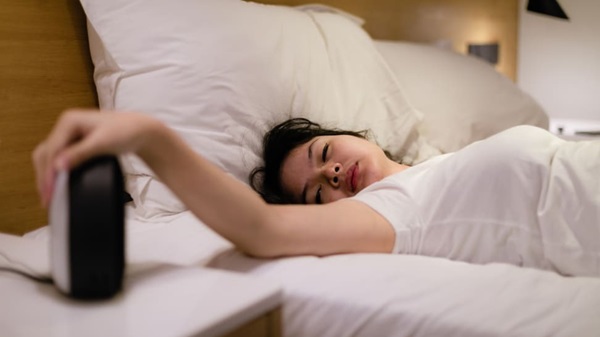You might oversleep 9 to 10 hours if you don’t sleep properly at night and when you recovering from an illness or making up for lost sleep from previous nights. However, if you sleep for a long time regularly, it could be a sign of a health problem like sleep disorder, mental health issue, or other health problem.
Many individuals worry about not getting enough sleep, however, sleeping too much or oversleeping can also be bad for your health and might mean there is an underlying health issue.
What is Oversleeping? How Much Sleep is Too Much?
Oversleeping is a condition of sleeping for long hours like more than nine hours in a twenty-four-hour period. Hypersomnia is a condition where you not only oversleep but also feel excessively sleepy during the day. It might be caused by narcolepsy and other sleep disorders. When frequent oversleeping affects your daily life, doctors may refer to it as excessive quantity of sleep (EQS). If the cause of your sleepiness is unknown, it is called idiopathic hypersomnia.

You might need at least seven hours of sleep each night on average. Adequate sleep is necessary for overall health and mental alertness. You might feel sluggish and have trouble focusing in the absence of proper sleep. Meanwhile, getting too much sleep can also negatively impact your health.
Moreover, your daily habits, activities, and sleep patterns also determine the exact amount of sleep you need each night. Some older adults might need only six hours of sleep while others, like athletes, might need an extra hour. Similarly, you may need more sleep sometimes than usual, such as after an intense workout or travel. But, if you regularly sleep longer and still feel tired during the day, it might indicate an underlying health issue.
Causes of Oversleeping
Oversleeping can be attributed to a variety of factors ranging from medical conditions to lifestyle choices. For instance, you might have to stay up late several nights to complete an important task or project. Due to this your sleep gets deprived and can lead you to sleep more than usual.
-
Depression and Mental Health Disorders
People who are dealing with depression often have excessive sleep. They might find it difficult to get out of bed and may sleep much longer than usual. Multiple studies have indicated a higher prevalence of depression among individuals who sleep for extended periods.
Similarly, other mental health conditions like anxiety and bipolar disorder, can also disrupt normal sleep patterns, sometimes resulting in oversleeping. People with anxiety disorders are more prone to experiencing prolonged sleep, which can cause them distress.
-
Sleep Disorders
Sleep disorders such as Sleep Apnea, Narcolepsy, and Restless Legs Syndrome might also cause oversleeping. Those with sleep apnea cause breathing interruptions during sleep, leading to poor sleep quality and excessive daytime sleepiness, which can result in prolonged sleep durations.
Similarly, a neurological disorder characterized by uncontrollable sleep attacks during the, leading to extended sleep times. Likewise, Restless Legs Syndrome (RLS) can make it difficult to fall asleep and stay asleep, which might result in compensatory oversleeping during other times.

-
Poor Sleep Quality
Poor sleep quality can lead to a feeling of unrefreshed rest, prompting individuals to sleep longer in an attempt to compensate for lost restfulness.
-
Sedentary Lifestyle
Lack of physical activity can contribute to feelings of lethargy and a higher propensity for prolonged sleep durations.
-
Substance Use
Alcohol and certain medications can interfere with the normal sleep cycle which leads to extended sleep times or irregular sleep patterns.
Also read, How to Stop Snoring? Here Are Some Tips You Can Apply To End Noisy Nights
Effects of Oversleeping
Oversleeping, while often considered less harmful than sleep deprivation, can have significant impacts on both physical and mental health. Understanding these consequences is crucial for maintaining a balanced sleep schedule and overall well-being.
Obesity: Oversleeping might cause you to gain weight. Studies have found that individuals who slept for nine or 10 hours each night are more likely to become obese compared to those who slept seven to eight hours. This link between sleep and obesity persisted even after considering food intake and exercise.
Diabetes: Extended sleep duration has been linked to a higher risk of developing type 2 diabetes. Research indicates that people who sleep excessively may experience disruptions in their glucose metabolism.

Mental Health Issues: While depression can cause hypersomnia, excessive sleep can also exacerbate mental health problems. It can lead to feelings of lethargy, low energy, and further depression.
Headache: Some people may experience headaches if they sleep longer than usual on weekends or vacations. Researchers think this happens because oversleeping affects certain brain chemicals like serotonin. Also, those who sleep too much during the day and disturb their nighttime sleep might wake up with headaches in the morning.
Tips for Avoiding Oversleeping
You prevent the negative consequences associated with oversleeping by managing your sleep schedule effectively. Here are some practical tips you can apply to avoid excessive sleep and promote healthy sleep habits:
-
Establish a Consistent Sleep Schedule
Set Regular Bedtimes and Wake-Up Times: Aim to go to bed and wake up at the same time every day, even on weekends, to regulate your body’s internal clock.
-
Prioritize Sleep Quality
Make your bedroom conducive to sleep by keeping it dark, quiet, and cool. Invest in a comfortable mattress and pillows to improve sleep quality. Minimize exposure to electronic devices such as smartphones, tablets, and computers at least an hour before bedtime, as the blue light emitted can interfere with melatonin production and disrupt sleep.
-
Practice Good Sleep Hygiene
Develop a relaxing bedtime routine to signal to your body that it’s time to wind down. This could include activities such as reading, taking a warm bath, or practicing relaxation techniques like deep breathing or meditation.
Refrain from consuming caffeine or nicotine in the hours leading up to bedtime, as they can interfere with your ability to fall asleep and stay asleep.

-
Monitor Your Sleep Duration
While short naps can be beneficial for some individuals, excessive daytime napping can disrupt nighttime sleep and lead to oversleeping. If you must nap, aim for a short nap of 20-30 minutes early in the afternoon. Resist the temptation to sleep in excessively on weekends or days off, as this can disrupt your regular sleep-wake cycle and lead to difficulty falling asleep at night.
-
Stay Active During the Day
Engage in regular physical activity, preferably earlier in the day, as it can promote deeper and more restful sleep at night. Avoid vigorous exercise close to bedtime, as it may interfere with your ability to fall asleep.
Spend time outdoors during the day, especially in the morning, to expose yourself to natural sunlight, which helps regulate your body’s circadian rhythm and promotes wakefulness during the day.
Frequently Asked Question
Is oversleeping unhealthy?
What causes oversleep?
You may also like to read: Beat the Heat: 8 Tips for Sleeping Soundly in Hot Weather
